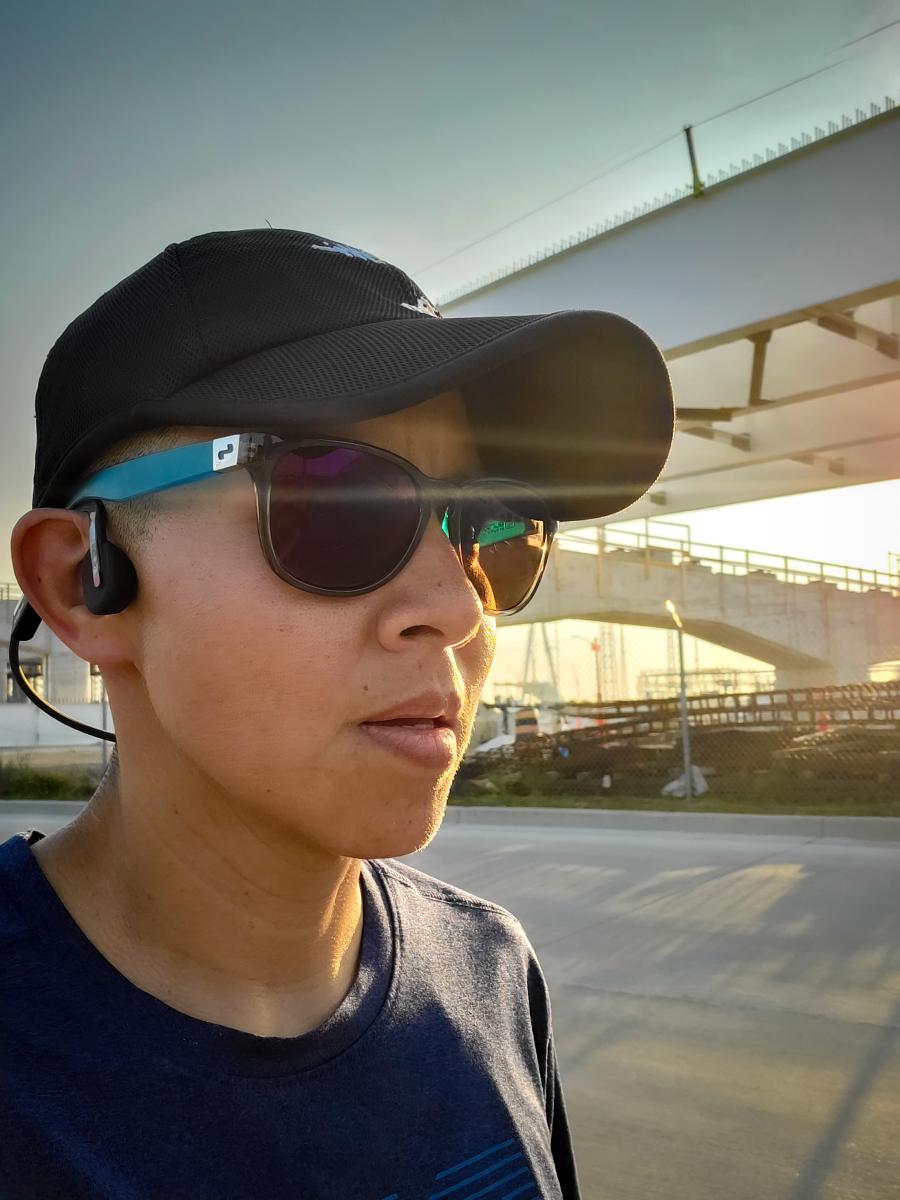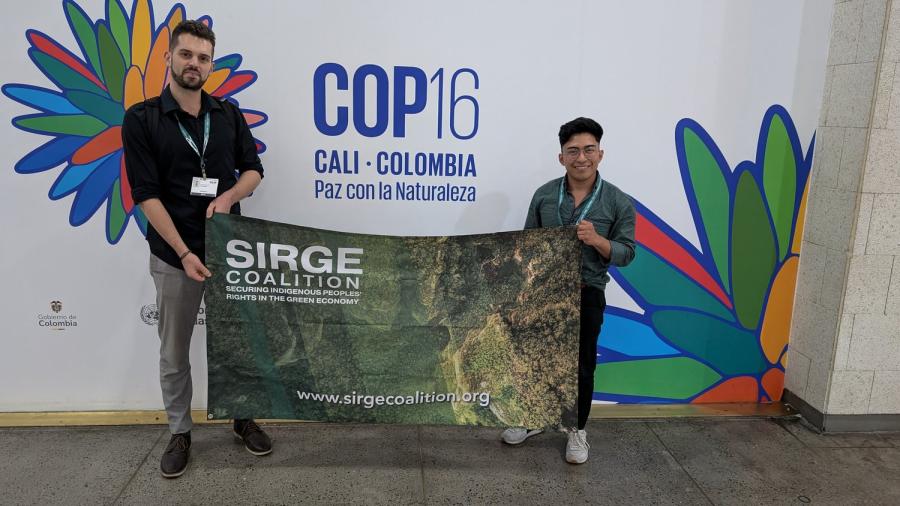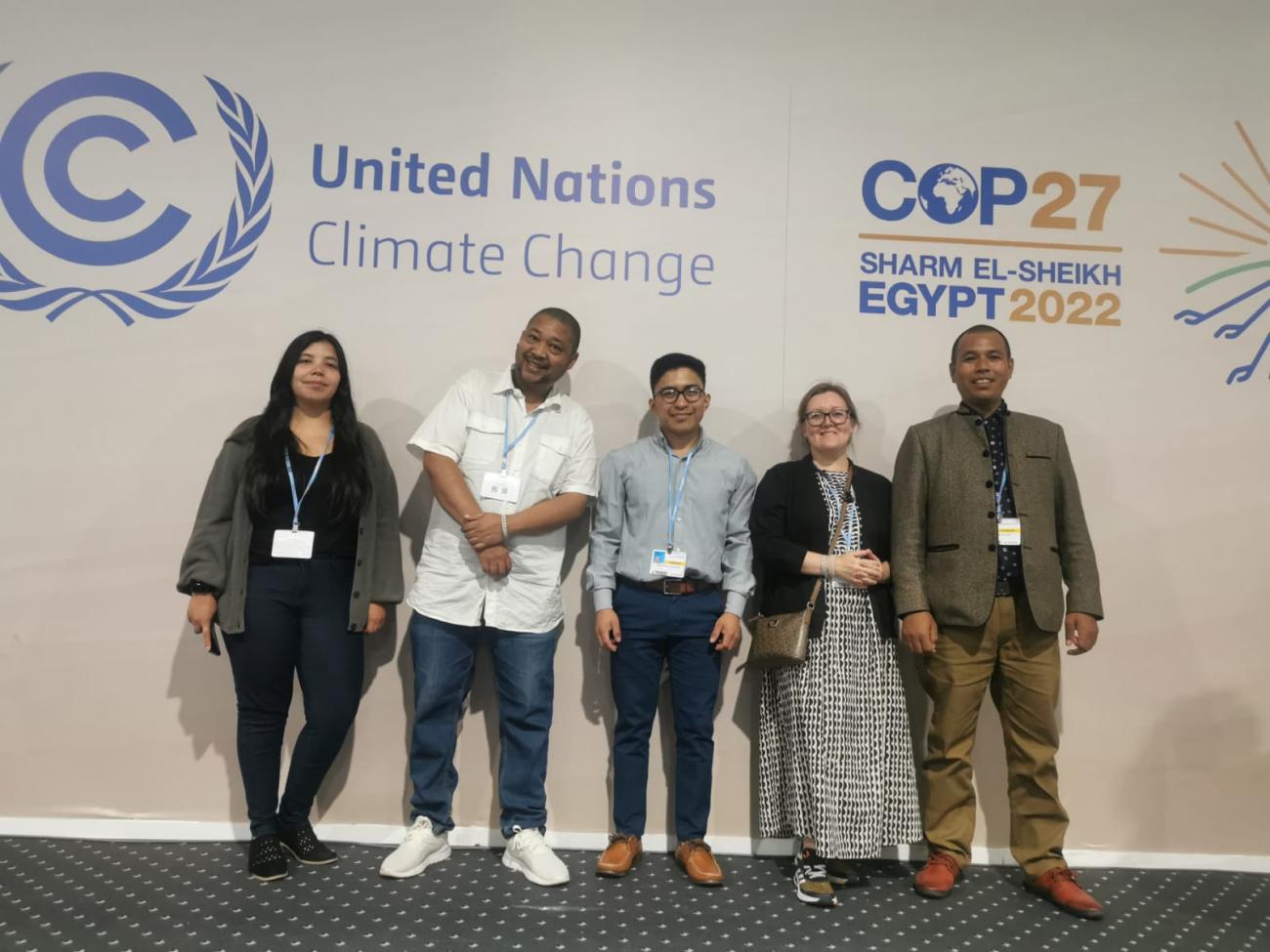
Cultural Survival's delegation is on the ground at the United Nations Framework Convention on Climate Change (UNFCCC) Conference of Parties (COP 27) in Sharm El Sheikh, Egypt. They participated in the two-day preparatory meetings of the International Indigenous Peoples Forum on Climate Change (IIPFCC), where over 200 Indigenous representatives from the seven sociocultural regions discussed key issues that will be presented to negotiators, such as Article 6 of the Paris Agreement, Loss and Damage and non-economic losses impacting Indigenous identities, cultures, languages, ceremonies, livelihoods. They also discussed topics such as financial mechanisms, direct access to funding for all Indigenous Peoples, human rights-based approach, and more. During the meeting, Indigenous representatives worked on the text of the Opening Statement of the IIPFCC which was delivered at the Opening Ceremony of COP 27 (see below).
Our delegation was also present at the Traditional Knowledge Holder's meeting and at the opening of the Indigenous Peoples Pavilion where Indigenous organizations and leaders from different territories around the world will be presenting their side events and cultural activities. In addition, our team participated in the discussion of Financial Mechanisms and Direct Access to Funds for Indigenous Peoples and made proposals and suggestions to the text that will be presented during this COP and the upcoming COP15 of the Convention on Biological Diversity in December this year, in Montreal. Our team has engaged several Indigenous leaders on the different thematic issues being discussed at the IIPC. Below, we share with you a sample of the interviews conducted.
Follow us on Facebook, Twitter, and Instagram as we report on key actions and takeaways from COP 27.
Statement of the International Indigenous Peoples Forum on Climate Change (IIPFCC) Joint Opening Plenary at COP27
Climate change is a matter of life and death. State actions have fallen far short, Greenhouse gas emissions and global temperatures are increasing, threatening genocide for Indigenous Peoples in Africa, the Arctic, Coastal, Small Island and all other ecosystems.
Indigenous Peoples’rights are inherent, collective and internationally recognized, including rights to life, self-determination, lands and territories, food systems, and free prior and informed consent. We will not allow these rights to be diminished by conflating us with minorities, vulnerable groups or local communities. Read more.
Indigenous Voices from COP 27
Aeshatou Manu (Mbororo) from Cameroon on How Climate Change Affects Indigenous Peoples
 Pasang Dolma - Sherpa (Sherpa) Talks About The History of COP
Pasang Dolma - Sherpa (Sherpa) Talks About The History of COP

Sele Tagivuni from Fiji: Indigenous Peoples And Local Communities Must Be Respected And Listened To

Jennifer Lasimbang (Kadazan): We Want Governments To Recognize Indigenous Knowledge

Great Grandmother Mary (Anishinaabe): Without The Rights Of Nature There Can Be No Us

Angel Levac Brant (Tyendinaga Mohawk): Youth Voices Are Often Under Represented

Greame Reed (Anishinaabe) On The Past And Future Of COP

Grace Balawang (Kankaney Igorot): Indigenous Peoples Need Direct Support To Restore Loss And Damage

Hindou Oumarou Ibrahim (Mbororo): We Are Here To Share Our Solutions

Tunga Rai (Rai): It Is Time To Implement The Paris Agreement

Pablo Mis (Maya Q'eqchi'): Investment Must Find Its Way Into The Hands Of Indigenous Peoples

Lisa Qiluqqi Koperqualuk (Inuit): Our Cultures Are Tied To Our Environment
Read Our Organizational COP 27 Statement Lea nuestra declaración organizativa de la COP 27 Statement towards Discontinuing the Use of the Collective Term “Indigenous Peoples and Local Communities” or “IPLC” Declaración para Suspender el uso del Término Colectivo “Pueblos Indígenas y Comunidades Locales” o “PICL”
Cultural Survival's Events at COP 27
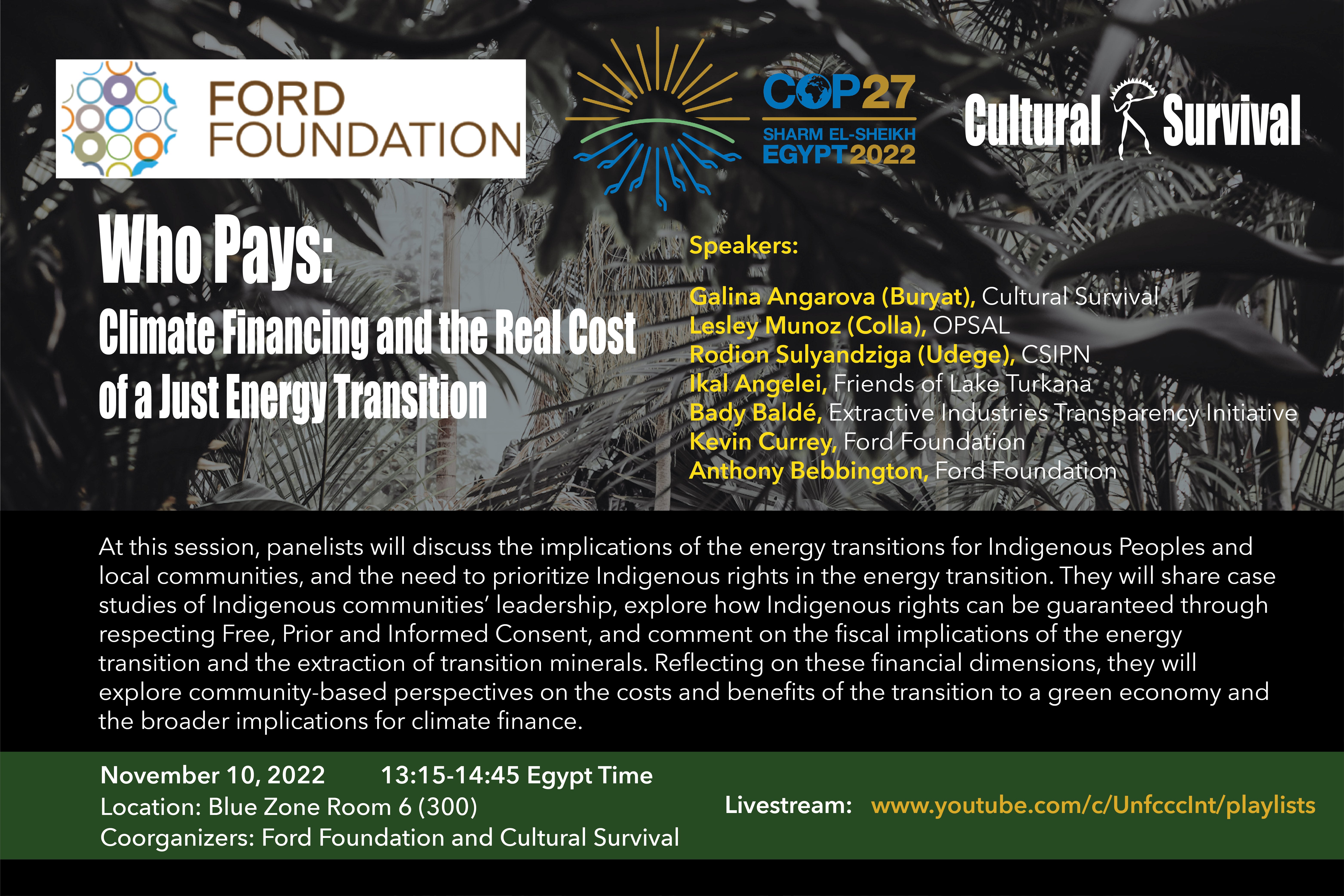
November 10, 2022 13:15-14:45 Egypt Time
Who Pays: Climate Financing and the Real Cost of a Just Energy Transition
Indigenous Peoples are facing a new wave of extractivism for transition minerals such as copper, nickel, cobalt, lithium, and other metals that are key in battery development for e-mobility and energy storage, as well as in the building of wind and solar technologies and new transmission networks. These projects are promoted as “green”, however, such mining projects risk replicating the same harms of the fossil fuel economy: threatening Indigenous Peoples’ rights and territories and destroying biodiverse ecosystems. At this session, community leaders and others will discuss implications of the energy transitions for Indigenous Peoples and other local communities, and the need to prioritize Indigenous rights in the energy transition. Panelists will share case studies of Indigenous communities’ leadership, explore how Indigenous rights can be guaranteed through respecting Free, Prior and Informed Consent, and comment on the fiscal implications of the energy transition and the extraction of transition minerals. Reflecting on these financial dimensions, panelists will explore community based perspectives on the costs and benefits of transition to a green economy and the broader implications for climate finance.
Location: Blue Zone Room 6 (300)
Coorganizers: Ford Foundation and Cultural Survival
Livestream: https://www.youtube.com/watch?v=IRADWN16IbM
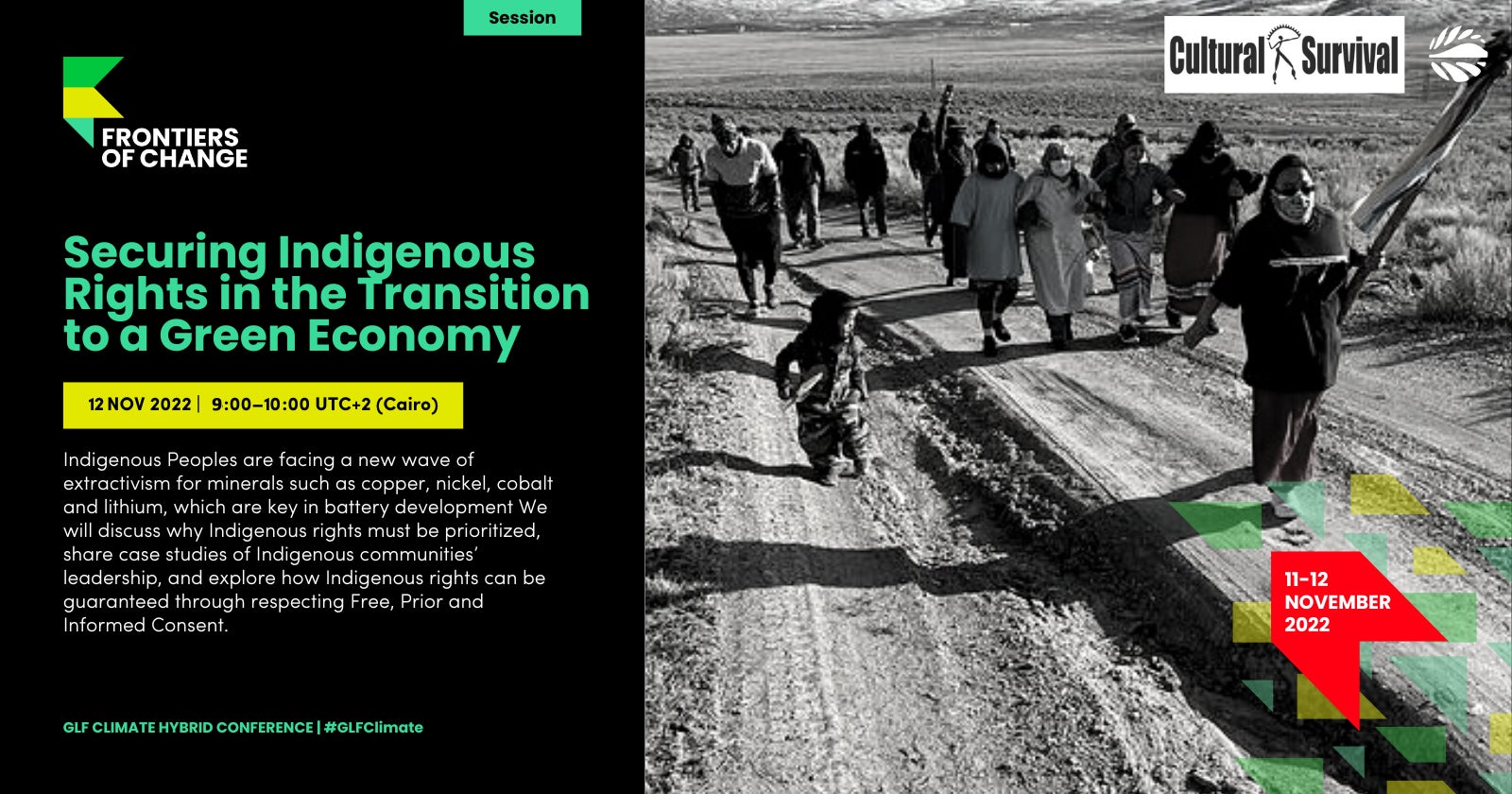
November 12, 2022 9:00 am Egypt Time
Securing Indigenous Rights in the Transition to a Green Economy
Indigenous Peoples are facing a new wave of extractivism for transition minerals such as copper, nickel, cobalt and lithium, which are key in battery development. These projects are promoted as “green” because they aim to supply minerals used in renewable energy and electric vehicles. However, these mining projects risk replicating the same harms of the fossil fuel economy: threatening Indigenous Peoples’ rights and territories and destroying biodiverse ecosystems. At this session, we will discuss why Indigenous rights must be prioritized, share case studies of Indigenous communities’ leadership, and explore how Indigenous rights can be guaranteed through respecting Free, Prior and Informed Consent.
Coorganizers: Global Landscape Forum (GLF) and Cultural Survival
Event link
Register to watch.

November 14, 2022 12:15 - 13:30 Egypt Time
Strengthening Indigenous Peoples' Resilience through Direct Access to Climate Finance
As part of the negotiations at COP27, Parties will consider clear financial targets for Mitigation, Adaptation, and financing for Loss and Damage. Indigenous Peoples and local communities note that an equivalent to less than 1% of Overseas Development Assistance for climate adaptation and mitigation is allocated to support Indigenous Peoples tenure and forest management from 2011-2020. Meanwhile, there is no literature to show aggregates on much climate finance Indigenous peoples are receiving to support their other climate initiatives. Indigenous Peoples note the need for direct access to finance and transparency in its distribution. There is also a need to recognize the equal need of Indigenous peoples in the global north for climate finance to support their climate mitigation and adaptation needs, including losses and damages. Our Side Event will focus on financial guarantees and transparent access to funding for Indigenous Peoples in all seven socio-cultural regions, as the basis for further development and progress on the Global Goal on Adaptation (GGA), which aims to strengthen resilience and reduce vulnerability to climate impacts.
Speakers:
Helen Magata (Kadaclan) - Program Coordinator Climate Change Adaptation and Mitigation, Tebtebba
Galina Angarova (Buryat) - Executive Director, Cultural Survival
Eileen Mairena Cunningham (Miskitu) - Southern CSO Active Observer to the Green Climate Fund
Joseph Ole Simmel (Maasai) - Executive Director, Mainyoito Pastoralists Integrated Development Organization (MPIDO)
Jon Petter Gintal (Sami) - Sámi Parliament
Rodion Sulyandziga (Udege) - Director of the Center for Support of Indigenous Peoples of the North CSIPN
Location: Indigenous Peoples Pavilion and online
Coorganizers: Cultural Survival & Tebtebba
Link to view.
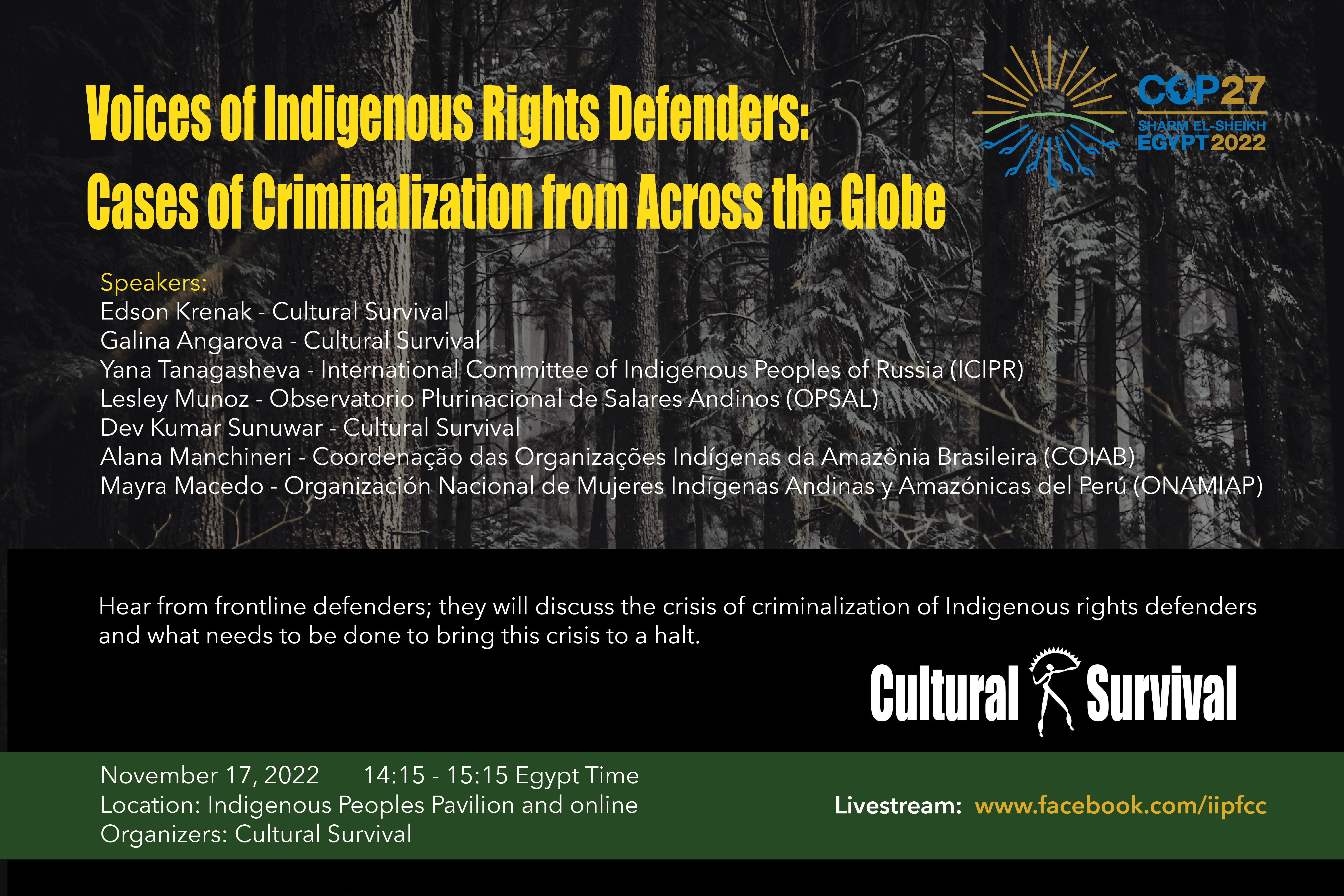
November 17, 2022 14:15 - 15:15 Egypt Time
Voices of Indigenous Rights Defenders: Cases of Criminalization from Across the Globe
Frontline Defenders reported that at least 331 human rights defenders were killed in 2020, 69 percent of whom were specifically defending Indigenous land or environmental rights and 26 percent of whom focused on Indigenous Peoples’ rights in particular. In the three years prior to October 2020, over 25 percent of rights defenders who were killed were Indigenous, despite representing just 6 percent of the global population. At this session we will hear from frontline defenders; they will discuss the crisis of criminalization of Indigenous rights defenders and what needs to be done to bring this crisis to a halt.
Speakers:
Edson Krenak - Cultural Survival
Galina Angarova - Cultural Survival
Yana Tanagasheva - International Committee of Indigenous Peoples of Russia (ICIPR)
Lesley Munoz - Observatorio Plurinacional de Salares Andinos (OPSAL)
Dev Kumar Sunuwar - Cultural Survival
Alana Manchineri - Coordenação das Organizações Indígenas da Amazônia Brasileira (COIAB)
Mayra Macedo - Organización Nacional de Mujeres Indígenas Andinas y Amazónicas del Perú (ONAMIAP)
Location: Indigenous Peoples Pavilion and online
Organizer: Cultural Survival
Link to view.
Cultural Survival staff will also be participating in other expert panels. Here is our itinerary of events (among others we will share soon):

November 11, 2022 18:30 - 19:30 Egypt Time
GLF Frontiers of Change Stewardship Economy Plenary
Join Galina Angarova (Buryat), our Executive Director, at GLF Climate 2022 - Stewardship Economy Plenary, where she will share about the need to center Indigenous Peoples' and human rights as well as true, regenerative practices as we transition to a green economy. Healthy and sustainable economies should mirror healthy ecological systems. Healthy ecosystems are interconnected and resilient to change; they are interdependent and regenerate each other, rather than depleting and weakening the system. A stewardship economy is one that brings ‘stewardship’ – land use practices and processes that foster the sustainable use and management of natural resources – to the heart of markets, governments, and nonprofit decision making and practices.
Location: Savoy Hotel Sharm El Sheikh and online
Register to watch.
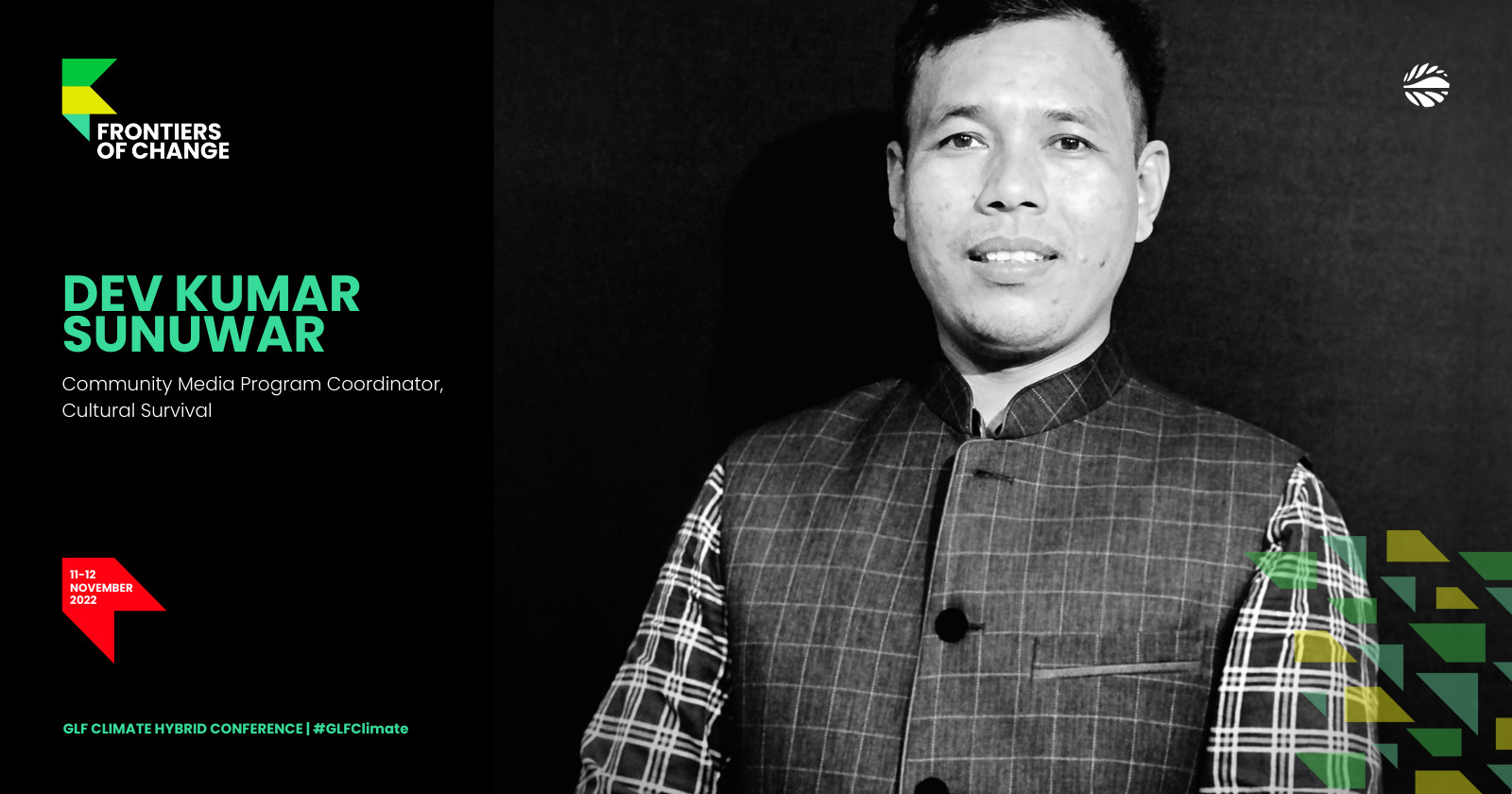
November 12, 2022 18:30 - 19:30 Egypt Time
GLF Frontiers of Change Closing Plenary
Dev Kumar Sunuwar (Koĩts-Sunuwar), Cultural Survival Community Media Program Coordinator, will participate at GLF Climate 2022 - Closing Plenary, where he will share about how we can ensure development pathways create value for Indigenous and local people based on low-carbon economies. The world of tomorrow will be defined by the decisions and actions of today. Join policy-makers, youth, producers, activists, Indigenous Peoples, and the business community in accelerating a just transition that puts people and nature on a path to recovery. Landscapes offer crucial opportunities for rebalancing the climate system by both removing carbon from the atmosphere and lowering emissions from land use. This plenary aims to inspire collective action, behavioral changes, nature and land-based solutions, political will, and incentives that offer hope for a decarbonized future. The time is now.
Location: The Egypt Hall and online
Register to watch.

Tuesday, November 15, 2022 11:30 am - 12:45pm Egypt Time
Weaving Perspectives Across Regions: The Need for Equitable Funding for Indigenous Women’s Leadership, Movement Building & Climate Solutions
Indigenous Women are on the frontlines of climate change and cross-cutting issues - from climate mitigation and adaptation to resilience, action, and justice. Indigenous Women are protecting natural resources, resisting extractive industries, protecting land and territory rights, upholding ancestral knowledge, and organizing by centering the rights, needs, voices of Indigenous Women, Girls, LGBTQ2+ Peoples. Yet, resourcing for Indigenous Women’s movement building is minimal, access to spaces that center Indigenous Women’s participation is limited, and climate financing is not reaching grassroots groups let alone Indigenous Women. This session highlights cross-regional perspectives from leaders who are calling for equitable funding to Indigenous women-led climate solutions and intersectional movement building.
Speakers:
Mrinalini (Tina) Rai - Women4Biodiversity
Salote Soqo - International Funders for Indigenous Peoples - (IFIP)
Lucy Mulenkei - African Women Indigenous Organization (AIWO)
Tarcila Rivera Zea - Foro Internacional de Mujeres Indigenas (FIMI)
Polina Shulbaeva - Cultural Survival
Organizers: Association des Femmes Peuls Autochtones du Chad (AFPAT), Cultural Survival, International Funders for Indigenous Peoples (IFIP), Foro Internacional de Mujeres Indígenas (FIMI)
Location: Indigenous Peoples Pavilion and online
Link to view.


